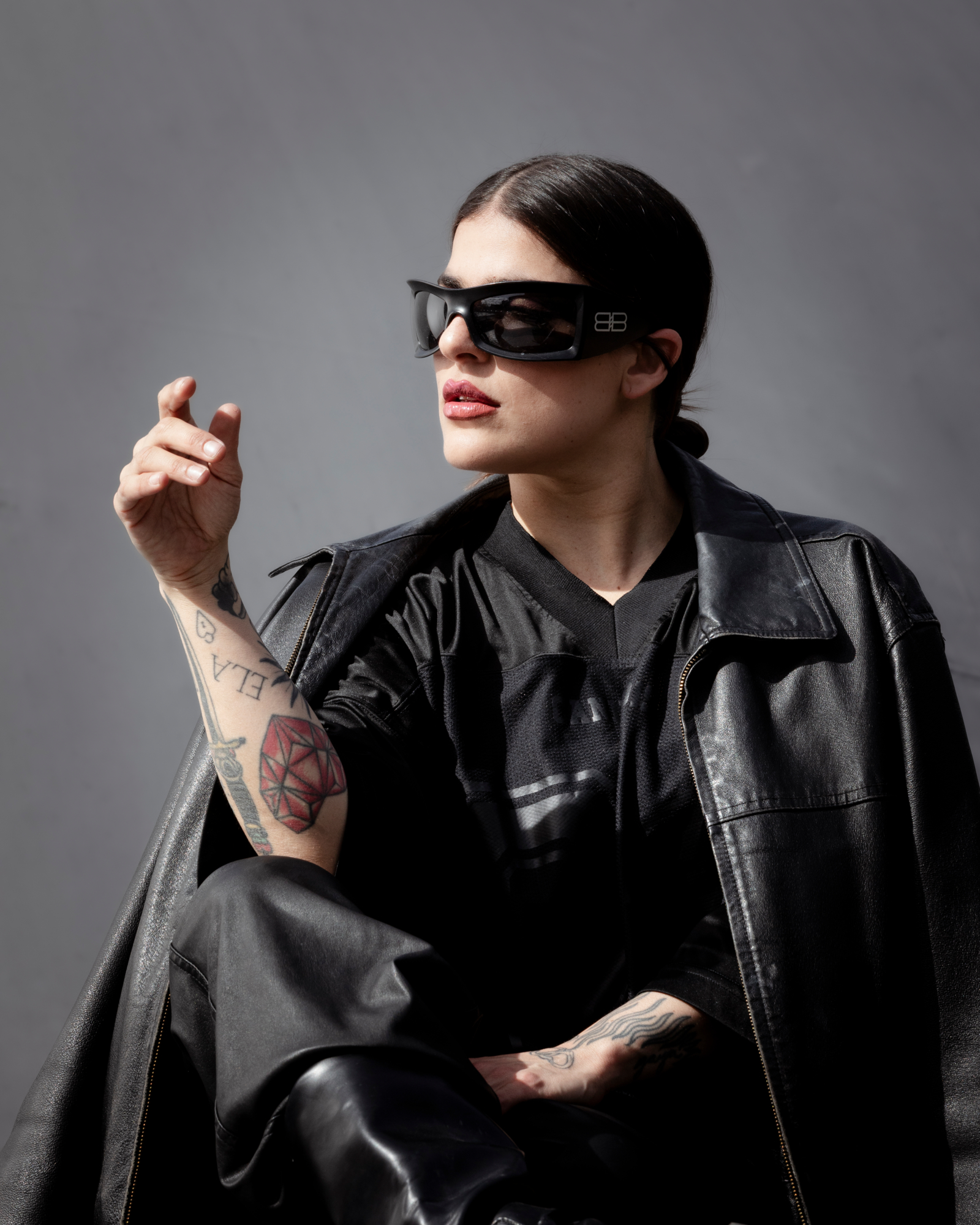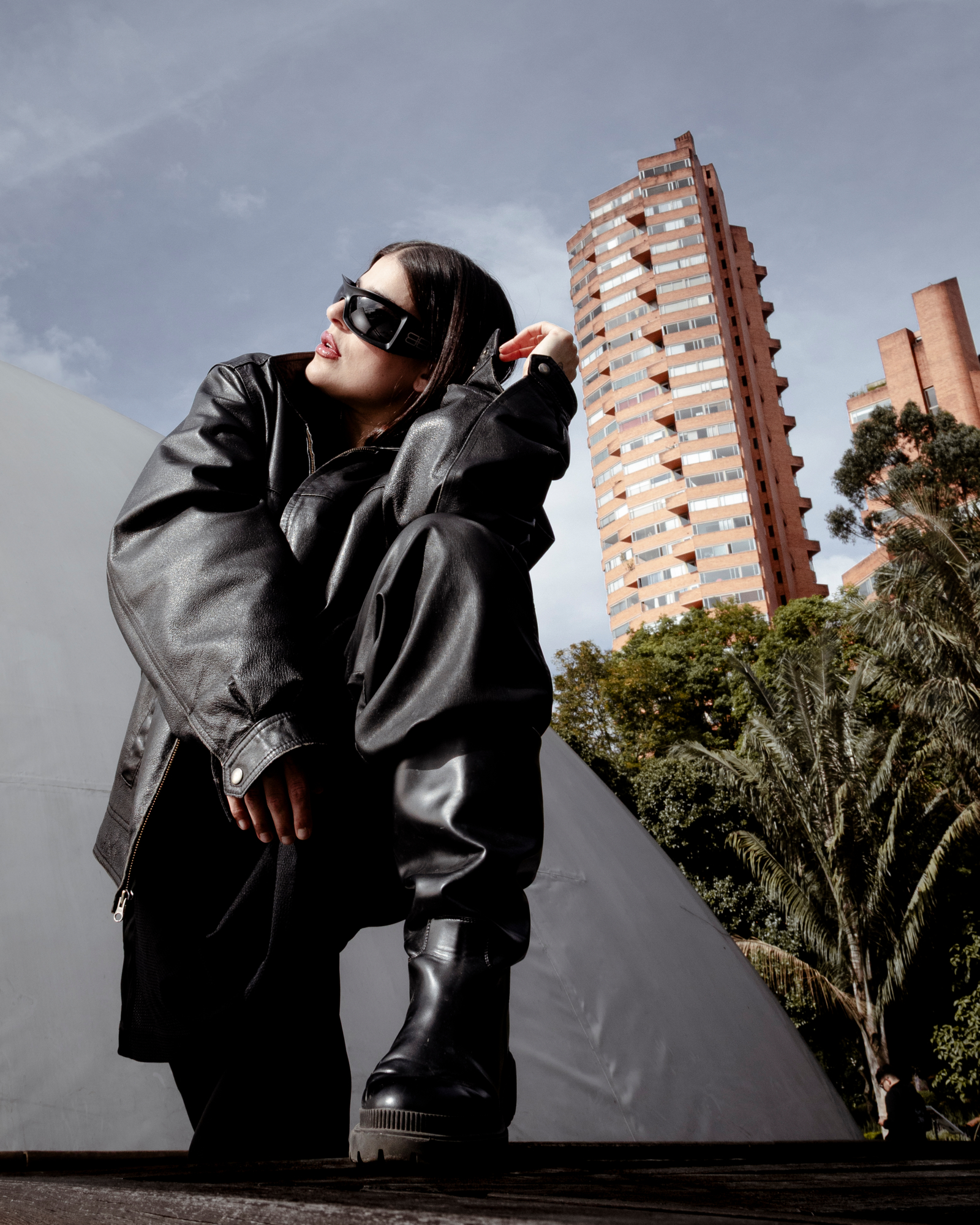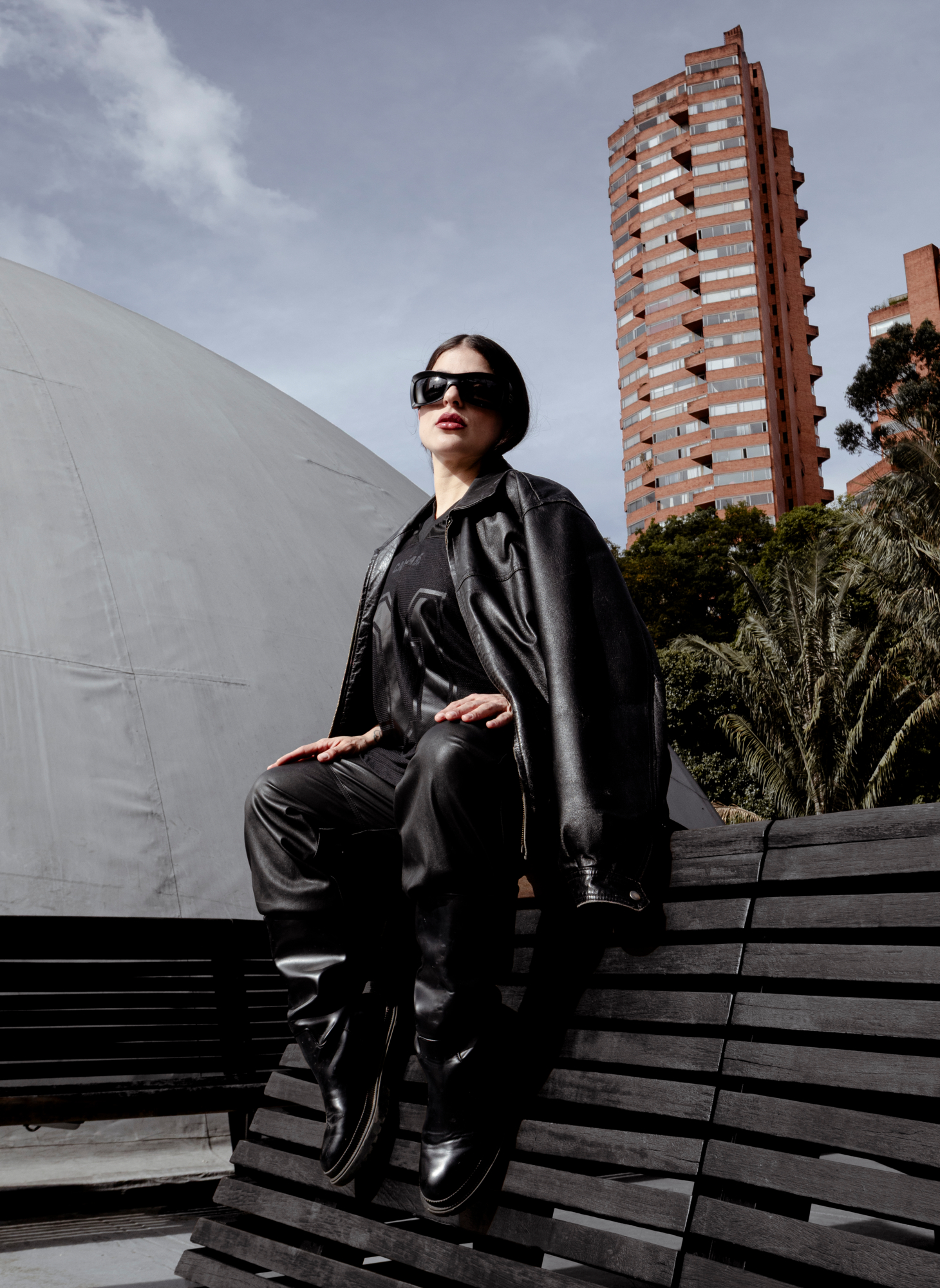Delfina Dib sums up her 10 years in Bogotá with 'Cerouno'.

It's Tuesday afternoon. Work time is leaving the office in the heart of Bogotá. People are rushing out of their offices, looking for a way home, dodging street vendors and the occasional young man on a skateboard. Delfina Dib gazes at the hills, amazed by the blue sky after days of rain. She admires the disorder of Bogotá, which has become so natural to her now. It's evident in the way she walks and crosses streets. She acknowledges that it's not an easy city and occasionally uses very Bogotá-style phrases or jokes, along with her Argentine idioms, to navigate the chaos.
Delfina Dib arrived in Bogotá from Buenos Aires 10 years ago to pursue a solo career as a rapper. Along the way, she found supportive friends in the scene, which she leveraged to continue her rise. Today, she has two full-length albums and several singles, collaborating with notable artists such as Astrid Cruz, Lianna, and Briela Ojeda. Last year, she was invited to the Colors platform, which gave her visibility and recognition in the music industry. She also fulfilled her dream of performing a solo concert at the Teatro Mayor Julio Mario Santo Domingo with a stunning production, reaffirming her position as an artist who isn't pigeonholed exclusively within the hip-hop or urban genres. On Friday, August 22nd, she returns with a special performance at the Bogotá Planetarium to celebrate her ten years in the city with the album Cerouno.
After Directo al cora, an emotional album born from a hangover, what does Cerouno bring?
Straight to the heart, it was like vomiting. I built Cerouno brick by brick at a time when I felt more grown-up, more womanly, more confident in myself, in what I wanted and what I didn't want. I've become more selective in many ways, which has made the curation of the songs more careful and artisanal. It was an album in which, before starting to write it, I asked myself: What do I want to say at this moment? What is my message?
In terms of music production, how was it built?
It's an album I built while traveling, so it's also more versatile. I immersed myself in each producer's universe, because I didn't work with just one like I did on the previous album. So, I got to play with the energy of a bunch of people, with their visions and the use of certain tools, which perhaps, when you work with just one producer, is a smaller universe. On the other hand, here I adapted to what each one had to offer, and that was beautiful, because there are ten very different songs.
Where did those trips go?
Medellín, the Canary Islands, Miami, Madrid, and Bogotá.
Where is Cerouno's exploration of sounds going?
It's a trap fusion album with a ton of colors. It has a lot of atmospheres and sounds, based on the idea that the song comes from the "musical kitchen" and not so much from going into the studio to force the song. I wanted to work with female producers, and while making this album, I met two with whom I felt incredibly comfortable working. I think we need to give much more visibility to female producers. Another aspect is that I worked with a producer from Japan, Ryosuke "Dr. R" Sakai, something new for me.

'Cerouno' is Delfina Dib's second full-length album. Photo: Andrea Moreno. El Tiempo
What was that experience like with that producer? What did you find new?
We made a song called Nassy, which is up for consideration for a Grammy. Making it allowed me to realize that you don't need to speak the same language to connect with someone. Music connects you and makes you enter into a very interesting and circular dialogue. Plus, it's a song that was included in FIFA 2025, so a lot of men started listening to me, from countries like Italy, the United Kingdom, France, Portugal, even Arab countries and places where video games are consumed, which isn't my niche. Suddenly I got there, and it's great.
Once you'd internalized the avalanche of emotions brought on by the heartbreak seen in 'Directo al cora,' where did you get inspiration for the new songs?
The trigger is basically reminding myself why I'm doing this and why I've been in Colombia for 10 years. That's why the album is called Cerouno; it's the number 10 backwards, playing with what life has in store for me. That's when I realized that zero, basically, is everything and nothing, and one is me. I feel like it's a kind of "ego trip," as they say in rap, when you speak from yourself, from your point of view, but in a positive way, not from a narcissistic ego, but from an ego that we can all identify with and empower ourselves with. Something like: They tried to kill me, and I was born again.
What three songs would you consider to be the thematic basis of 'Cerouno'?
I really like "Gardel en el avión" because I feel it speaks a lot about migration and the fusion between Colombia and Argentina, due to his death on a plane in Medellín with all his musicians. I wanted to use the concept that sometimes I feel like I'm not from anywhere, but I'm from everywhere too. Another song is "Cerouno," which gives the album its name and is basically an anthem. It's hard to choose the third, but I'd say "Día de mi suerte," which is a song I wrote in the Canary Islands. It talks about how sometimes you feel like things aren't going the way you want them to, but you still trust that everything will be okay.

The Argentine came to the capital from Buenos Aires to build her career in the hip-hop scene. Photo: Andrea Moreno. El Tiempo
Between one album and the next, is there anything that changed your way of creating music ?
Yes, I embraced the idea of being part of an industry, which isn't easy, because many people reject it and don't like it. I can be part of it and still be myself. Still, being an independent artist gives me the freedom to release a song whenever I want, wear what I want, and do what I want with the flyer and the visuals. It's very free in that sense. I realized I had to be honest about that, because otherwise I'd always be in an internal fight. On the other hand, I also changed my relationship with social media. I really like Instagram and I love listening to podcasts, but I struggled with creating my content. Lately, I got hooked, and now I think of ideas and then I say to myself, "Wow, I'm liking this." It's 2025, and you have to tell people who you are, what your songs are about, why you make music. Sometimes you think that by making music, that's it, but no, now it's time to knead the dough, bake, and go out and sell the bread.
After 10 years of living in Colombia, what is your relationship with the country?
I'm doing very well. Sometimes I wonder what place I occupy in the scene? And I don't quite understand, but I don't know if I should understand. People always tell me, 'You're doing well,' so I say, 'How nice!' Because people do see my potential.
What's it like to create in a country other than your own? What freedoms and disadvantages does it offer you?
I feel very natural; I feel very free creating here. The thing is, Colombia is already my home. I've integrated into the rhythm, from waking up really early to suddenly eating an arepita for dinner. People ask me, "Do you consider yourself a bit of a rola?" And, well, I am a bit of a rola. I lived my entire 20s here, that time when you begin to understand who you are and where you're going.
Do you still define yourself as a rapper today?
I don't define myself exclusively as a rapper because I believe I'm a singer and I really like singing. Gardel en el avión, for example, allows me to mix tango with trap and rap. I started singing rap more out of necessity, because I realized that rap is a very effective and quick way to express what I feel, to convey it directly. But I define Cerouno as a trap fusion album: it has Brazilian funky, Mexican corrido, R&B, trap, rap, and electronica.

Delfina will present a 360-degree immersive experience at the Bogotá Planetarium. Photo: Andrea Moreno. El Tiempo
What can concertgoers expect at the Bogotá Planetarium?
I can't describe it as a show because it's more of an immersive experience. We're going to have a 360-degree stage in the center of the dome, where people will be standing. And we're going to use incredible visuals.
After 10 years of creation, where are you looking?
To the movies. I think about movies and I want to cry. I'm fascinated by local films. It's been a long time since I loved a movie before seeing it, and that happened to me with Simón Mesa's Un Poeta. I mean, before seeing it, I already loved the movie, and I went to the premiere and cried the whole movie.
Friday, August 22, 2025.
Tickets available at Tu Boleta $111,900 + service.
Instagram @andreamorenoph
eltiempo



%3Aformat(jpg)%3Aquality(99)%3Awatermark(f.elconfidencial.com%2Ffile%2Fbae%2Feea%2Ffde%2Fbaeeeafde1b3229287b0c008f7602058.png%2C0%2C275%2C1)%2Ff.elconfidencial.com%2Foriginal%2F02b%2F16c%2F51d%2F02b16c51d6577db09a115c29c77b1d62.jpg&w=1280&q=100)